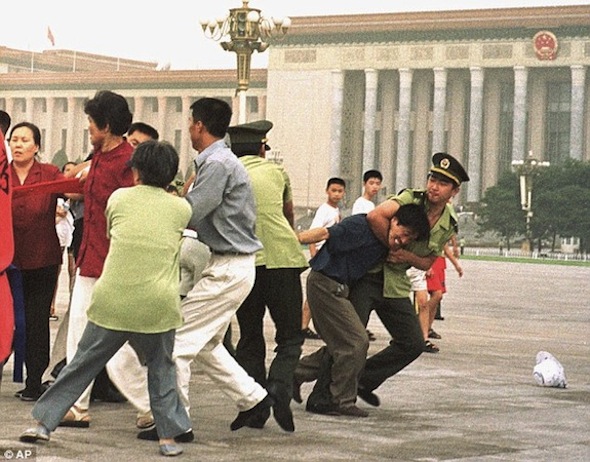FALUN GONG: 13 YEARS OF PERSECUTION
YsMEDIA
By Gregory Grozos
Behind the glamorous facade of economic and industrial development lies a darker side to today’s China. Among the numerous cases of China’s human rights violations, one of the least known issues and arguably one of the most significant ones, is the persecution of Falun Gong.
But first, what exactly is Falun Gong? Falun Gong features meditation and a set of gentle exercises as well as a way to cultivate one’s character in everyday life by following the principles of truth, benevolence and tolerance. It quickly became immensely popular in China and in just seven years, following its public introduction in 1992, Falun Gong practitioners came to number 100 million, according to official estimates. A great number of people reported significant improvement in their health as well as more harmony in the family and the workplace.
In July of 1999, the Chinese president and leader of the Communist Party, Jiang Zemin, decided to ban the practice and launched a vicious and massive campaign in an effort to “eradicate” Falun Gong. Despite the fact that Falun Gong does not espouse any political views, Jiang considered it a threat to the Chinese regime, mainly because of its unprecedented popularity, its independence from the state and its traditional spiritual values, the essence of which contradicts the materialist values promoted by the authoritarian state. Sources cited by the Washington Post, state that, “Jiang Zemin alone decided that Falun Gong must be eliminated,” and “picked what he thought was an easy target.”
Perhaps the most prominent feature of the campaign has been its prevalent use of extreme torture. Torture of Falun Gong adherents has been documented in each of China’s provinces, in jails, labor camps, brainwashing centers, and schools in China’s big cities, small towns, and villages.
Popular torture techniques include shocking with electric batons, burning with irons, tying the body in painful positions for days, force-feeding saline solutions through a plastic tube inserted up the nose, and prying out fingernails with bamboo shoots, to name a few; rape and sexual torture of the Falun Gong in detention are prevalent as well.
For hundreds of thousands, the most basic reality of the campaign has been long periods of detention in “reform through labor” camps – China’s Gulag system. There they are forced to work up to 20 hours per day, producing – without pay – toys, Christmas tree lights, chopsticks, and soccer balls for export. Those who refuse are tortured.
In labor camps, jails, as well as the special reeducation centers, all detained Falun Gong practitioners have been forced to undergo brainwashing. The Communist Party’s goal is to force these people to renounce their spiritual beliefs and come to view Falun Gong as dangerous, as well as to turn in others who are active in exposing the persecution.
The Party’s ultimate solution for the vast number of imprisoned Falun Gong adherents, however, is much more terrifying. According to current and former hospital employees, the Falun Gong have been used in the deadly practice of organ harvesting – they have been killed by the thousands so that their organs can be used for on-demand transplants.
Livers, kidneys, hearts, and cornea are removed from the living, anesthetized Falun Gong adherents with matching blood-types and sold to Party officials and other individuals from China and abroad. Undercover investigators’ phone calls to Chinese hospitals have caught doctors admitting this practice on tape. This gruesome practice has come to light largely through an independent investigation by Canadian MP David Kilgour and human rights lawyer David Matas.
From day one of the suppression, the regime banned all books and informational media produced discussing Falun Gong positively. All websites relating to the practice were immediately blocked. Millions of Falun Gong books were forcibly seized and burned publicly. The regime feared people might learn, if they knew not already, that Falun Gong was a healthy, normal, and positive way of life embraced by millions.
These censorship efforts have, of course, extended to cyberspace, thanks in no small part to Western companies who have enthusiastically sold Internet surveillance technology to the Party’s security apparatuses. As a result, Chinese people are now in jail for posting evidence of torture online or even downloading articles about Falun Gong.
Alongside censorship, the Party has sought to vilify Falun Gong through an aggressive and massive propaganda campaign. The regime has been determined to paint Falun Gong as dangerous, deviant, and abnormal in an effort to make ordinary Chinese citizens become part of the persecution.
The Falun Gong have responded to all of this with markedly peaceful means. Throughout thirteen years of persecution, they have refused to adopt violence. Instead, adherents first tried to reason with Communist Party rulers through letters and petitions. When these failed, the Falun Gong turned to Tiananmen Square where – through quietly meditating or displaying banners before being arrested – they sought to call upon the conscience of the Chinese people as well as world leaders. As the persecution continued, the Falun Gong began countering state propaganda by distributing information exposing the persecution through leaflets, VCDs, emails, and phone calls.
Collectively, this resistance movement – composed of bold individual acts in spite of great personal risks – constitutes what is probably today’s largest non-violent movement in the world.
Websites:
www.falundafa.org
www.faluninfo.net
http://organharvestinvestigation.net/
 Gregory Grozos is a mixed media artist based in Athens Greece. His work includes intricate three dimensional miniature worlds and detailed drawings. He also practices Falun Gong, an ancient Chinese self-cultivation method, and works for the defense of persecuted Falun Gong practitioners in China.
Gregory Grozos is a mixed media artist based in Athens Greece. His work includes intricate three dimensional miniature worlds and detailed drawings. He also practices Falun Gong, an ancient Chinese self-cultivation method, and works for the defense of persecuted Falun Gong practitioners in China.


